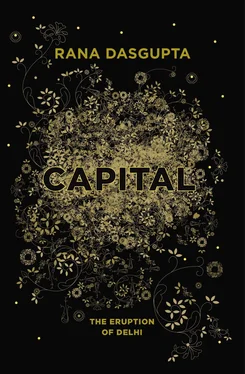“We are lucky in India to have the windfall of political money. That puts huge capital into the system. And there is also enormous ability, enormous vision. While corporations operate from quarter to quarter, politicians have a five- to ten-year perspective. That’s why the two can work together so well. Look at all these new deluxe hotels: politicians acquire the land and they work with corporations to produce world-class products. It is a tested model. Right now this vision is directed at the cream, but later it will serve the masses. Because now all black money leads back into corporate activities. Our bureaucrats have immense administrative capability, and the coming together of political wealth, bureaucratic skills and the corporate ability to manage leads to magic.”
It should be clear that this system rewarded people with skills conventionally regarded as underhand, and they often aroused intense disdain among so-called sophisticates. Few of the new billionaires came from the old, anglicised elite, to whom the requisite hustle had become alien over the years. Many of them had moved to Delhi, in fact, from surrounding states — such as Uttar Pradesh and Haryana — where they had operated a local political — commercial nexus even before 1991. English was often not their first language, and their tastes were untrained. They put escalators in their houses because they had seen them in five-star hotels, they scattered banknotes around them like feudal overlords, and they paid for Bombay actors and Los Angeles rap stars to perform at their weddings. But perhaps this, now, was ‘taste’. It certainly seemed that the contempt in which the old elite held these people was another sign of its obsolescence. The emerging class’s embrace of naked money, as a principle and as a style, equipped it very well for success, not only in the new India, but in the rest of the world too, which broadly was following suit.
Earlier in this book we saw how fondly and often India was likened to America. But for the most part, this was pure ideology. India had much more obvious similarities to America’s alter ego: Russia. India and Russia had both had systems of state-run capitalism that had foundered by the 1980s, generating a new class of clever, underground entrepreneurs who came into their own after the old systems — almost simultaneously — collapsed. Both countries developed systems, after that point, in which the existence of electoral democracy did not prevent the emergence of a class of oligarchs who used the political system to take control of their countries’ essential resources. Both of them had capital cities, Moscow and Delhi, where the majority watched with resentment as a small number of people used the immense power of large-country politics to their commercial advantage.
And yet, perhaps the distinctions between all these places, even with America, were fading away. In the early twenty-first century, it seemed, the question of over-powerful business elites was local news everywhere. There was a convergence in global culture, and it was not in the direction we were trained to expect. Perhaps everything, in fact, tended towards Russia. We had always imagined that Russia was global capitalism’s primitive past. Perhaps it was its future.
• • •
Mickey Chopra makes a timid entrance into the quiet hotel lounge where he has asked me to meet him. He wears a black turban and suit; he is stocky and muscular and speaks with a faint lisp. He is twenty-eight years old.
He is not talkative. I try to break the ice by telling him that we have a friend in common, and we discuss her for a while. He relaxes.
I ask him about his life.
“Until I was a teenager,” he says, “I thought my dad worked for the government. I used to ask, ‘Why do we have this big house?’ They told me, ‘Your grandfather built it, then we lost the money and now your dad works for the government.’”
In truth, Mickey’s father ran a large assembly of businesses across the states of Uttar Pradesh, Haryana and Punjab. The mainstay of this empire was liquor retail, a business which, in gangster states like Uttar Pradesh, offered rewards only to the shrewd, charismatic and violent.
“Of course there were goons around — you can’t run this kind of business without a strong arm — but my dad always kept them out of our sight. He believed in discipline. He said, ‘If you do bad things, like if you get caught for drunk driving, I can’t get you off.’ A lot of powerful people said to their sons, I can get you off anything. It makes for a different kind of mentality. Of course, later I discovered that there was nothing I could have done that my dad couldn’t have got me out of.”
Mickey’s father is present throughout his conversation as a kind of spiritual touchstone.
“The company was set up by my great-grandfather in 1952. My family were livestock farmers in West Punjab and they lost everything in 1947. They set up in Uttar Pradesh, where they had to fight to make it.
“When my father took it over in the 1980s, the family was in debt. Now the group has an annual turnover of $1 billion. My father’s will to succeed is phenomenal. If he sets out to do something, he will get it done. If there’s someone I want to become, it’s him.”
Mickey speaks about the family business in the first-person plural. He has grown up absorbing business ideas and techniques, and they are a natural part of his speech.
“When our liquor business was at its height, we controlled 19 per cent of Indian liquor retail. At that time, the government auctioned liquor outlets to the highest bidder. Later on it introduced a lottery system to prevent monopolies. But we could still grow the business because we had so many employees. In any lottery in our region, out of 100 entrants, 80 were our men.”
Mickey was sent to a series of expensive schools, but he was repeatedly expelled, and at the age of sixteen he dropped out for good. He went to London for a year or two to have fun: clubs, parties, and everything else that a teenager with a well-stocked bank account can think up.
When he came back, he was put in charge of one of the family’s sugar mills. But his heart was not in it — and the real estate boom was on. In 2001, the family set up a real estate business and Mickey, twenty-one and entirely untrained, was given the task of building the largest shopping mall in northern India.
“When I was in England I spent a lot of time walking around malls, studying how they were made. There’s no point re-inventing the wheel. I know more than anyone in India about how you set up a mall, how you arrange your brands. My father had no experience in a professional context, so everything I know about the professional context I’ve learned myself. I introduced computer systems into the business: I taught myself Oracle programming because the professional contractors were no good. Then I taught myself all about the latest building techniques. My first mall was built with special pre-fabricated steel pillars which had never been used in Indian malls before. Recently, I taught myself finance. I read finance texts online and every time I didn’t know a word, I looked it up. Six months ago I didn’t know anything and now I can conduct finance meetings with PriceWaterhouse.”
Mickey’s mall was famous for having Delhi’s most luxurious and hi-tech nightclub. It was Mickey’s pet project, his personal party zone, with endless champagne for him and his friends — and his nightly arrival there, surrounded by bodyguards, was always a frisson.
“For a time I was the man in Delhi. Loads of people wanted to be my friend. Women wanted to sleep with me. I said to my wife, ‘If I hadn’t been married, things would have been very different.’ A lot of people were very fake.”
Читать дальше











